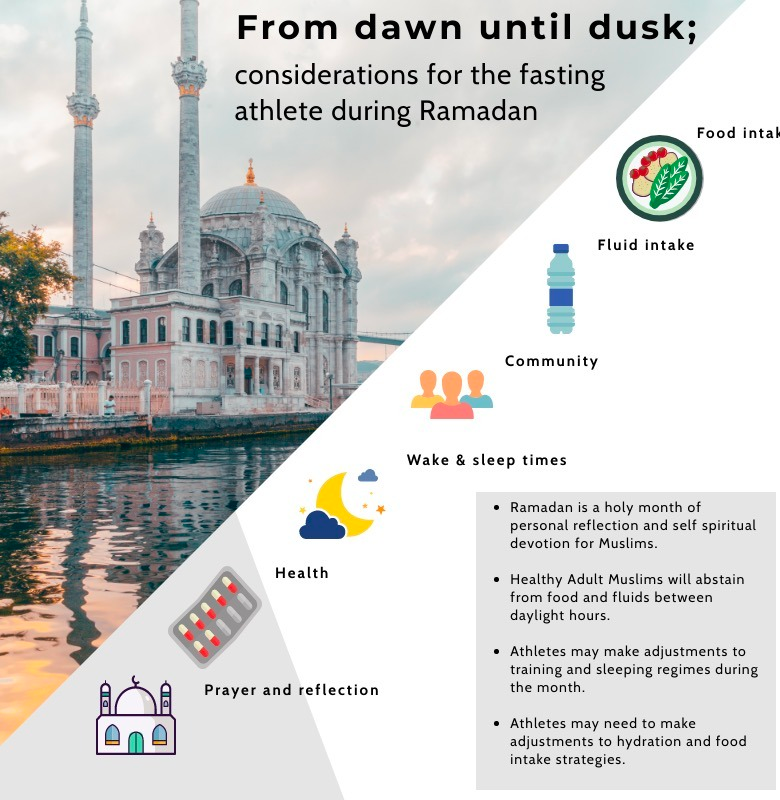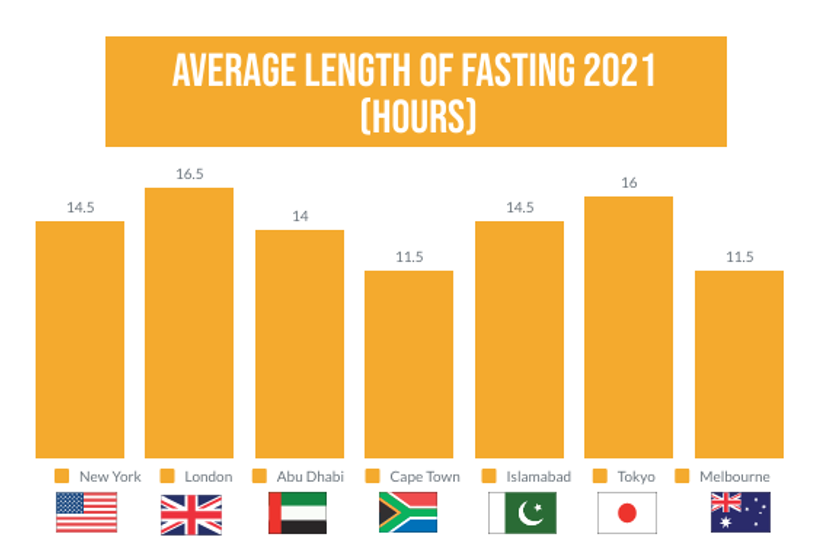From dawn until dusk; considerations for the fasting athlete during Ramadan.
Every year, Muslims anticipate the holy month of Ramadan, as 30-days of spiritual reflection, prayer, charitable donations and personal sacrifice. The most outward sacrifice is fasting, where healthy adult Muslims abstain from food, drink, and medications during daylight hours. We discuss some of the challenges and opportunities facing elite athletes who are competing and for patients who are taking part in physical activity during this month.
The Islamic calendar follows the lunar year, and Ramadan is the 9th month of the year. Each year this is an eagerly anticipated month, where many Muslims will take part in daily fast from dawn until dusk. Fasting is one of the key observances that Muslims undertake alongside spiritual (worship) and personal development and is a crucial part of their faith. Many high-profile athletes have spoken of the challenges they may encounter with their recovery and performance, but some comment on improvement in their focus. Additionally, it has been felt that a greater awareness promoted amongst teammates and planning from medical staff has supported their safe participation in sports.

Figure 1 – Adjustment’s athletes may make for Ramadan:
- Waking in the early morning hours to eat a pre-dawn meal (suhoor) – It is advised that athletes take on board adequate fluid intake and a balanced meal that includes slow-release carbohydrate energy sources and protein.
- Breaking their fast in the evening with a meal (iftar) at sunset – This may be adapted around training times. However, in general, athletes might have a small meal of fast releasing carbohydrates and fluids to break the fast, followed by a larger meal of slower releasing carbohydrates.
- Adjusting their sleep and wake times – Some athlete may prefer to power nap during the day for (45-60 minutes) to maintain their daily sleep volumes.
- Restricting or cutting out caffeine – it is recommended to restrict caffeine intake to aid sleep duration and quality and to avoid its diuretic effect. Some athletes may also have their sleep volumes and quality of sleep assessed by questionnaires and/or sleep apps to ensure they are recovering adequately.
- Some athletes may choose fast for two weeks before Ramadan or intermittently fast throughout the year to acclimatise themselves to training in a fasted state.
- During Ramadan, athletes may prioritise charitable or community work or time for spiritual development (prayer) during time away from training.
- Some athletes may choose to tailor their workouts for Ramadan by reducing exercise intensity and duration.
The physiological challenges of fasting
The exact length of fasting varies according to the season and latitude of the country that athletes live in – but in general optimising glycogen storage, avoiding hypoglycaemia, and dehydration are common challenges for all athletes. This is particularly important for hot or humid environments or when endurance sessions >60 minutes are performed. (1) Once-a-day, shorter training strategy or moving sessions to cooler evening slots can reduce the physiological impact of fasting on athlete’s performance. However, further research is needed in this area to help guide athletes and support medical recommendations for acclimatisation to periods of fasting.

Supporting athletes on the decisions regarding fasting
For some athletes, the decision on if, how and when to fast is a key part of competition preparation. In the recent past, several high-profile sporting events have also taken place during this month, including the Olympics (2012), soccer world cup (2014) & cricket world cup (2019). While it is accepted that several exemptions from fasting may apply, for instance, if athletes are travelling, are unwell, or due to health reasons – some athletes may fast for the whole month or periods of training between sporting events. Personalised advice and medical support on training loads and nutrition can be vital to helping athletes during this month, as well as pastoral support from coaches and peers. (2,3)
Physical activity for amateur athletes or patients in the general population
Patients who are fasting may use the month of Ramadan to reinforce positive health behaviour changes such as smoking cessation, dietary changes or increasing their physical activity levels. While some patient may require additional guidance regarding the frequency, intensity, time and type of exercise, the general guidance is that exercise should be encouraged and can be accumulated throughout the day in a short burst (e.g, 10-15 minutes)
Healthcare professionals may also take the opportunity to discuss the cardiovascular and metabolic benefits of fasting and offer practical advice where possible, such as portion control, eliminating unhealthy foods and regular engagement in light exercise. (4) Studies looking at the role of intermittent fasting in diabetic patients have shown it to be effective at reducing body weight, decreasing fasting glucose, decreasing fasting insulin, reducing insulin resistance and decreasing leptin levels, all of which can optimise the management of patients with diabetes and chronic cardiovascular conditions. (5)
Medical aspects to consider during fasting
- Medication adjustments may be required for athletes or patients. This may include a medical review to consider switching formulations (sustained-release v immediate release) or using a different administration route during Ramadan. (6–8)
- Athlete education and a greater awareness of fasting practices amongst medical staff and teammates can improve athlete’s wellbeing during Ramadan. This will include awareness of signs and symptoms of medical illness to look out for (e.g., hypoglycaemia, dehydration and heat-related illness).
- Athletes are permitted to break fasting for medical emergencies. The majority opinion allows for the use of inhaled medication or the administration of intramuscular injections such as the COVID-19 vaccine during fasting hours. (9)
- Significant dehydration is associated with a reduction in aerobic performance, so adequate fluid intake must be maintained throughout the non-fasted hours.
- Mouth rinsing** with water has been proposed as a way to limit the negative impact of oral dehydration on performance and may help to reduce the incidence of dental decay and reduce the effects of periodontal disease.
Conclusion – Key points
- Fasting athletes may benefit from individualised nutrition and hydration strategies to help them perform and recover from training and competition during Ramadan.
- Athletes commonly cite support from medical staff and coaches as a key factor in their decision to safely compete whilst fasting.
- Further research is required to better understand the physiological changes that occur in the fasted athlete.
* individual fasting practices may vary by athletes.
** some athletes may object to mouth rinsing – if they are concerned about inadvertently swallowing water.
References:
- Che Muhamed AM, Mohamed NG, Ismail N, Aziz AR, Singh R. Mouth rinsing improves cycling endurance performance during Ramadan fasting in a hot humid environment. Applied Physiology, Nutrition, and Metabolism. 2014;39(4):458–64.
- Farooq A, Herrera CP, Zerguini Y, Almudahka F, Chamari K. Knowledge, beliefs and attitudes of Muslim footballers towards Ramadan fasting during the London 2012 Olympics: a cross-sectional study. BMJ open. 2016;6(9):e012848.
- Chamari K, Roussi M, Bragazzi N, Chaouachi A, Abdul R. Optimizing training and competition during the month of Ramadan: Recommendations for a holistic and personalized approach for the fasting athletes. Tunis Med. 2019;97(10):1095–103.
- Trabelsi K, el Abed K, Trepanowski JF, Stannard SR, Ghlissi Z, Ghozzi H, et al. Effects of ramadan fasting on biochemical and anthropometric parameters in physically active men. Asian journal of sports medicine [Internet]. 2011 Sep;2(3):134–44. Available from: https://pubmed.ncbi.nlm.nih.gov/22375232
- Albosta M, Bakke J. Intermittent fasting: is there a role in the treatment of diabetes? A review of the literature and guide for primary care physicians. Clinical diabetes and endocrinology. 2021;7(1):1–12.
- Grindrod K, Alsabbagh W. Managing medications during Ramadan fasting. Canadian pharmacists journal : CPJ = Revue des pharmaciens du Canada : RPC [Internet]. 2017 Apr 3;150(3):146–9. Available from: https://pubmed.ncbi.nlm.nih.gov/28507649
- Khalife T, Pettit JM, Weiss BD. Caring for Muslim patients who fast during Ramadan. American family physician. 2015;91(9):640–2.
- Chamsi-Pasha H, Ahmed WH, Al-Shaibi KF. The cardiac patient during Ramadan and Hajj. Journal of the Saudi Heart Association [Internet]. 2014/04/20. 2014 Oct;26(4):212–5. Available from: https://pubmed.ncbi.nlm.nih.gov/25278723
- Ali SN, Hanif W, Patel K, Khunti K, South Asian Health Foundation, UK. Ramadan and COVID-19 vaccine hesitancy-a call for action. Lancet (London, England) [Internet]. 2021 Apr 7 [cited 2021 Apr 11];0(0). Available from: http://www.ncbi.nlm.nih.gov/pubmed/33838109
Authors and Affiliations:
Dr Omar Naji, Dr Zaf Iqbal, Dr Irfan Ahmed, Dr Samara Afzal, Mr Kosta Ikonomou, Ms Sidra Awan, Dr Assif Ahmed, Dr Katiji Ali, Mr Nabil Shah, Dr Karim Chamari
Dr Omar Naji
FY2 doctor – Watford General Hospital
omar.naji1@nhs.net
Twitter: @omarnaji_
Dr Zafar Iqbal
Consultant in Sports and Exercise Medicine
Head of Sports Medicine Crystal Palace FC
Twitter: @sportsdrzaf
Dr Irfan Ahmed
Sport & Exercise medicine registrar (London deanery) & GP (Primary care)
Twitter: @ExerciseIrfan
Dr Samara Afzal
GP (primary care)
Netherton Health centre
Twitter: @SamaraAfzal
Kosta Ikonomou
Sports physiotherapist
Twitter: @thesmileyphysio
Ms Sidra Awan
Senior Critical Care Pharmacist
Twitter: @Rafeeki4
Dr Assif Ahmed
Dentist / prosthodontist
Twitter: @IdealDental4
Dr Katija Ali
GP (primary care)
Twitter: @katijaali
Mr Nabil Shah
Physiotherapist Leicester City FC
Professor Karim Chamari
Head of ASPREV (Aspetar sports injury and illness prevention program),
Aspetar, Qatar Orthopaedic and Sports Medicine Hospital, Doha, Qatar
Twitter @ ProfChamari
No relevant conflicts of interest declared by any of the authors.